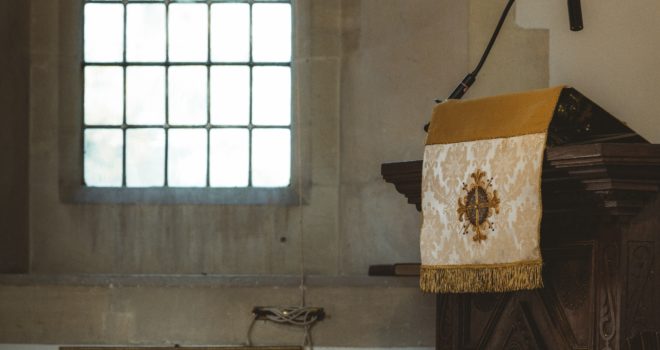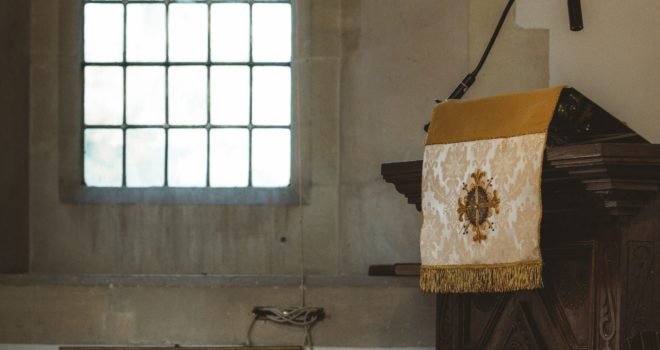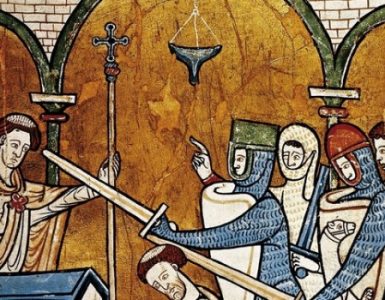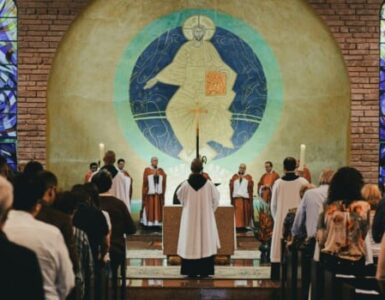
It is the essence of the Church to have a lot of low masses and no sermons.
–Hilaire Belloc
It’s a truism to say that the pulpit is at the center of most Protestant worship whereas the altar is at the center of the Mass, but nothing drives that point home better than a bad homily.
When my non-Catholic friends express curiosity about Catholic worship, I struggle to help them understand that Mass is first and foremost about fulfilling an obligation, and what we might get out of it is of secondary consideration. I’ll explain that liturgy is, quite literally, the “work of the people,” and it’s no secret that human work can be kind of routine and even boring sometimes. Yes, we always receive Jesus in spades at every Mass, wonder of wonders!, but our first purpose is to go and bend the knee – it’s a Commandment after all.
My Evangelical friends just don’t get this, and so I’m always happy when they join me at Mass to experience it for themselves – although I know what the fallout will often be: Scrunched up faces and raised eyebrows as they suffer through seemingly mindless ritual, rote prayers, and the occasional lousy sermon.
“Is the preaching always this bad?” they might ask.
“Sometimes worse,” I’ll offer gleefully. “Or, on weekdays, sometimes we luck out and get no sermon at all!”
“Then,” they’ll wonder aloud, “why go at all?”
Ah, there’s the nub, and it’s why bad homilies played a role in my conversion. As an Evangelical inquirer, I recognized very early on that the Mass was the heart of Catholic faith and practice, so I went as often as I could – daily even after a while. I endured many a bad sermon in those days, especially at the weekday liturgies, but they helped to cement the idea in me that the Mass is a numinous encounter that does not depend on clever preaching whatsoever.
Instead, it’s an encounter that is much more rich and profound and (most importantly) dependable than mere sermonizing. It’s an encounter borne of proclamation of a written Word and, more particularly, celebration of a Sacramental drama, the Eucharist. The setting might be a gorgeous cathedral with beautiful music accompanied by a well crafted and scintillating sermon, or it might be a drab suburban chapel with an off-the-cuff homily from a harried priest who spent the night at the bedside of a dying parishioner. No matter: Jesus will show up at both. Sure, we’d prefer inspirational and energetic preaching, but it’s not at all necessary.
Indeed, there’s a benefit to mediocre preaching once in a while, and it’s this: The faithful will be all the more likely to focus on what’s most important in the Mass if they aren’t distracted by the brilliant homily. “A preacher may be able to hold the attention of his listeners for a whole hour,” Pope Francis wrote in Evangelii Gaudium, “but in this case his words become more important than the celebration of faith.”
The Holy Father went on to stress that the “homily cannot be a form of entertainment,” distracting us from Jesus as he comes to us in Word and Sacrament, “yet it does need to give life and meaning to the celebration.” It’s a tricky balance, no doubt, so be on your guard if you’ve developed a taste for great preaching. A diet of superb, memorable homilies might tempt those in the pews to grow attached to the homilist, and the last thing the Church needs are personality cults, sermon groupies, and church-hopping in search of jazzy hermeneutics and/or rhetorical pyrotechnics.
How do I know that? Easy. Those are precisely the things we converts left behind when we joined the Church – and we don’t miss them at all.
Photo by Annie Spratt on Unsplash













